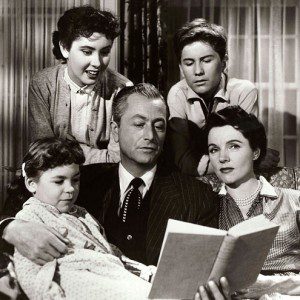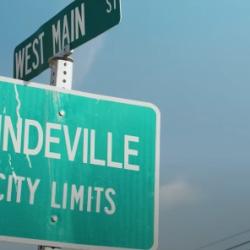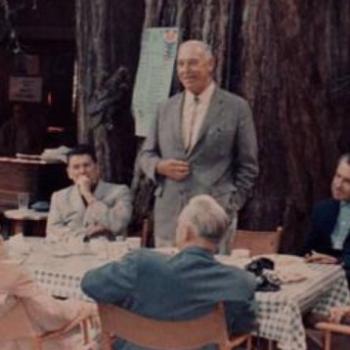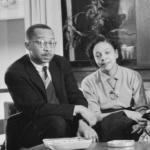If the evangelical reaction to the Louie Giglio inaugural brouhaha seems familiar, that’s because it is. It’s mostly a repeat performance of the same song the same folks were singing when the fast-food chain Chick-fil-A was criticized last summer for funding anti-gay groups.
Same range of complaints, same range of complainers.
No need, then, to reinvent the wheel in responding to this rendition. Let’s just go back to one of the better responses to the earlier round, from Wayne Self at Owldolatrous, who wrote of the flustercluck:
This isn’t about mutual tolerance because there’s nothing mutual about it. If we agree to disagree on this issue, you walk away a full member of this society and I don’t. There is no “live and let live” on this issue because Dan Cathy is spending millions to very specifically NOT let me live. I’m not trying to do that to him.
Asking for “mutual tolerance” on this like running up to a bully beating a kid to death on the playground and scolding them both for not getting along. I’m not trying to dissolve Mr. Cathy’s marriage or make his sex illegal. I’m not trying to make him a second-class citizen, or get him killed. He’s doing that to me, folks; I’m just fighting back.
Self is describing an asymmetrical situation — “there’s nothing mutual about it.” This is not to say that the situation was entirely one-sided. Chick-fil-A and its owners and supporters were subjected to some harsh criticism and pointed ridicule and I’m sure that was unpleasant for them. Such unpleasantness, however, is not in any way comparable to the unpleasantness Self describes of having powerful people funding powerful lobbyists determined to invalidate one’s marriage or to make one legally a second-class citizen.
Nor can the unpleasantness of being criticized and ridiculed be separated from the immediate cause of that criticism and ridicule — the fact that the criticism and ridicule is a response to those folks trying to enforce, encode and defend legal discrimination.
So both sides have real grievances, but those grievances are in no way proportional or comparable. Hold that thought.
I was reminded of Self’s splendid post on the Chick-fil-A business when reading another terrific post from last year by Doug Muder of The Weekly Sift. Muder’s “The Distress of the Privileged” gives a name to something that we all recognize.
I don’t know if Muder coined the term “privileged distress” or not, but I learned it from him and I’ve found it invaluable. Privileged distress. The distress of the privileged. The anxiety that the privileged feel when others begin to enjoy the same privileges that had previously been exclusive to them. Ah, yes, that.
As Muder writes, “Once you grasp the concept of privileged distress, you’ll see it everywhere.” Actually, you saw it everywhere even before that, but you just didn’t know how to articulate and classify what it was you were looking at.
He describes the idea by reminding us of a scene from the movie Pleasantville:
In a memorable scene from the 1998 film Pleasantville (in which two 1998 teen-agers are transported into the black-and-white world of a 1950s TV show), the father of the TV-perfect Parker family returns from work and says the magic words “Honey, I’m home!”, expecting them to conjure up a smiling wife, adorable children, and dinner on the table.
This time, though, it doesn’t work. No wife, no kids, no food. Confused, he repeats the invocation, as if he must have said it wrong. After searching the house, he wanders out into the rain and plaintively questions this strangely malfunctioning Universe: “Where’s my dinner?”
Poor Mr. Parker, he says, is experiencing privileged distress:
As the culture evolves, people who benefited from the old ways invariably see themselves as victims of change. The world used to fit them like a glove, but it no longer does. Increasingly, they find themselves in unfamiliar situations that feel unfair or even unsafe. Their concerns used to take center stage, but now they must compete with the formerly invisible concerns of others.
If you are one of the newly-visible others, this all sounds whiny compared to the problems you face every day. It’s tempting to blast through such privileged resistance with anger and insult.
Tempting, but also, I think, a mistake. The privileged are still privileged enough to foment a counter-revolution, if their frustrated sense of entitlement hardens.
So I think it’s worthwhile to spend a minute or two looking at the world from George Parker’s point of view: He’s a good 1950s TV father. He never set out to be the bad guy. He never meant to stifle his wife’s humanity or enforce a dull conformity on his kids. Nobody ever asked him whether the world should be black-and-white; it just was.
George never demanded a privileged role, he just uncritically accepted the role society assigned him and played it to the best of his ability. And now suddenly that society isn’t working for the people he loves, and they’re blaming him.
It seems so unfair. He doesn’t want anybody to be unhappy. He just wants dinner.
Read the whole thing. It’s long, but it’s rich (and it includes plenty of insight that I’m not including here even despite the huge chunks I’m quoting).
One of the valuable insights Muder provides is that privileged distress involves legitimate distress for those who experience it. Mr. Parker never had to go without dinner before, but now he does. That is unpleasant for Mr. Parker.
Muder argues that we should acknowledge the reality of Mr. Parker’s experience, because privileged distress is a tipping point and Mr. Parker remains powerful enough that we do not want to tip him the wrong way. We should have compassion for Mr. Parker’s situation but, unlike Parker himself, we should also keep that situation in its proper proportion and perspective:
George deserves compassion, but his until-recently-ideal housewife Betty Parker (and the other characters assigned subservient roles) deserves justice. George and Betty’s claims are not equivalent, and if we treat them the same way, we do Betty an injustice.
The important thing here is not just that you and I recognize the distinction of what is due, respectively, to Mr. and Mrs. Parker, but also that we help George Parker to understand this. We have to help him come to see that his claim is not equivalent — that “there’s nothing mutual about it” and that the compassion he seeks does not trump, or equal, the justice due to his wife and to others.
Muder outlines what is at stake here:
All his life, George has tried to be a good guy by the lights of his society. But society has changed and he hasn’t, so he isn’t seen as a good guy any more. He feels terrible about that, but what can he do?
One possibility: Maybe he could learn to be a good guy by the lights of this new society. It would be hard. He’d have to give up some of his privileges. He’d have to examine his habits to see which ones embody assumptions of supremacy. He’d have to learn how to see the world through the eyes of others, rather than just assume that they will play their designated social roles. Early on, he would probably make a lot of mistakes and his former inferiors would correct him. It would be embarrassing.
But there is an alternative: counter-revolution. George could decide that his habits, his expectations, and the society they fit are RIGHT, and this new society is WRONG. If he joined with the other fathers … of Pleasantville, maybe they could force everyone else back into their traditional roles.
I think what we’re seeing from white evangelicals after the Giglio controversy, and what we saw earlier on Chick-fil-A Appreciation Day, is the struggle of a group poised between those two choices, those two possible responses: Adaptation or counter-revolution.
This awkward moment between possibilities is characterized by what I’ll call grievance envy.
 Let’s stick with poor George Parker. There he is just as Muder describes him, betwixt accepting and rejecting the change that he’s still struggling to understand.
Let’s stick with poor George Parker. There he is just as Muder describes him, betwixt accepting and rejecting the change that he’s still struggling to understand.
And at that point he begins to perceive two things he hadn’t seen before. First, he notices that these others have a grievance, and that it is a legitimate grievance that gives them just cause to complain. (The clearest illustration of this is the “I wish I didn’t have to say this” tone of much recent writing reaffirming the traditional condemnation of homosexuality.) And the second thing Mr. Parker notices is that this grievance is powerful and compelling — that it gives those others a solid moral standing. He begins to see, in other words, that he is losing the argument precisely because the other side has a legitimate and serious grievance.
And so he attempts to respond in like manner. If their legitimate grievance gives those others an undeniable moral standing, well, then he has a legitimate grievance too. And keep in mind, he does — no one has brought him his customary dinner and he is experiencing a real, inconvenient and unpleasant peckishness.
If they have their complaints and grievances, then he has his, too. He didn’t see this contest coming, but if this is how the rules of this new world work, then he’ll do his best to match them grievance for grievance.
Again, I think this is what we’re seeing now from many white evangelicals in response to LGBT people and their increasingly bold demands for legal equality, marriage equality, equal protection in the workplace and equal standing in the church. We’re seeing grievance envy. The cruel reality and awful legitimacy of LGBT people’s complaint is beginning to sink in, and evangelicals have begun to apprehend, however partially, that this gives the argument for equality a compelling moral force. Evangelicals are beginning to grasp that this is why they are losing the argument, and maybe even that this is why they cannot win.
And so they instinctively do what nearly all of us humans do when first surprised by and confronted with the grievances of others: They start asserting their own list of grievances as though it was Festivus Day.
Here is a classic example of what I’m talking about:
Evangelicals are frequently mocked in popular culture, frequently given a raw deal in academia and elite media, and evangelicals who hold to traditional views of sexual ethics are — as the Louie Giglio affair shows — increasingly shoved to the side of the public square.
This is an attempt to claim mutuality despite the fact that, as Wayne Self patiently pointed out, “there’s nothing mutual about it.” This complaint is so utterly disproportionate, so completely asymmetrical and incomparable as a counter-claim that it’s tempting just to dismiss it as nothing more than self-centered, narcissistic flailing.
And when I say “it’s tempting,” that’s because this is what I am tempted to do, and what I often have done, and what I’m struggling not to do even here in this post.
I’m not suggesting that it’s wrong to regard this wholly disproportionate attempt to equate grievances as self-centered and narcissistic, or even that it’s wrong to characterize it as such, because that characterization is accurate. What I mean is that it’s wrong to completely dismiss such attempts and the vastly lesser grievances they inflate — both because that lacks compassion, and because it’s likely to produce poor results, nudging the privileged closer to using the power of their privilege to reassert itself in a counter-revolution.
Just like poor bewildered George Parker, these folks deserve a measure of compassion. Keep in mind that part of what it means to be privileged is that you don’t ever have to realize it. That’s why the “invisible knapsack” is invisible. They’re trying to make sense of a confusing new world. Confusion and obliviousness can produce the same effects as malice, but they require a different response.
Louie Giglio and his supporters have always thought of themselves as good guys. And they’re accustomed to being perceived as good guys. And I’m sure most of them don’t want that to be merely perception — they want to actually be good guys. But they’re no longer quite as sure what that means, or whether that’s even still possible. The world has changed around them and they’re trying to figure out this new world with its new rules. And why hasn’t anybody brought them dinner, already?
We need to help them sort through all of that — to help them see that counter-revolution is not their only option.
I think Muder is right when he says of Mr. Parker, “Which choice he makes will depend largely on the other characters.” Those others will have to show “firmness together with understanding,” he says, for Parker to see that “becoming a good guy in the new world” is still possible.
It may also depend, in part, on those other characters’ willingness to “engage in a correspondence” — perhaps for years.
Now, of course, George Parker cannot be my primary concern or my main priority. Justice for Mrs. Parker is a more urgent demand than compassion for Mr. Parker. But if compassion for Mr. Parker helps to rescue him from becoming a counter-revolutionary, then it will also help to rescue her from suffering the effects of his counter-revolution.
Such a counter-revolution will not and cannot be won, but it’s best for us all if, to whatever extent possible, we can keep it from being waged in the first place.
















